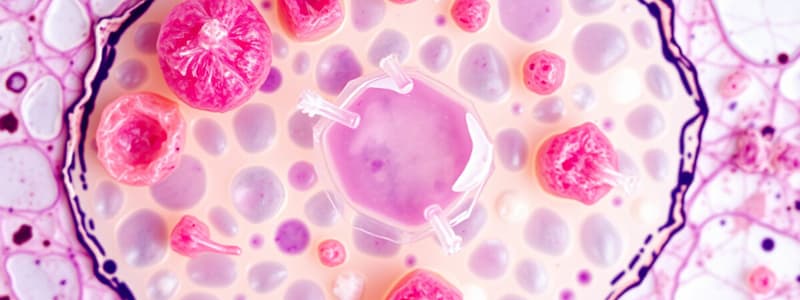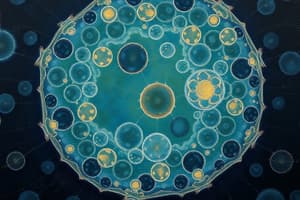Podcast
Questions and Answers
What component primarily makes up the cell wall of prokaryotes?
What component primarily makes up the cell wall of prokaryotes?
- Chitin
- Protein
- Cellulose
- Peptidoglycan (correct)
What is a capsule in prokaryotic cells primarily used for?
What is a capsule in prokaryotic cells primarily used for?
- Cell division
- Energy production
- Adhesion to surfaces (correct)
- Nutrient absorption
Which of the following statements is true regarding eukaryotic cells?
Which of the following statements is true regarding eukaryotic cells?
- Their DNA floats freely in the cytoplasm.
- They possess a true nucleus. (correct)
- They are smaller than prokaryotic cells.
- They lack organelles.
Which type of reproduction is primarily associated with prokaryotes?
Which type of reproduction is primarily associated with prokaryotes?
How is the DNA in prokaryotic cells organized?
How is the DNA in prokaryotic cells organized?
Which of the following is NOT a characteristic of eukaryotic cells?
Which of the following is NOT a characteristic of eukaryotic cells?
What is one of the main reasons eukaryotic cells are generally larger than prokaryotic cells?
What is one of the main reasons eukaryotic cells are generally larger than prokaryotic cells?
Which kingdoms contain prokaryotic organisms?
Which kingdoms contain prokaryotic organisms?
What best distinguishes prokaryotic cells from eukaryotic cells?
What best distinguishes prokaryotic cells from eukaryotic cells?
Which of the following is a feature of prokaryotic cells?
Which of the following is a feature of prokaryotic cells?
When did prokaryotic cells first appear on Earth?
When did prokaryotic cells first appear on Earth?
What is the primary component of prokaryotic DNA?
What is the primary component of prokaryotic DNA?
Which characteristic is NOT consistent with prokaryotic cells?
Which characteristic is NOT consistent with prokaryotic cells?
Which of the following statements about eukaryotic cells is true?
Which of the following statements about eukaryotic cells is true?
What role do ribosomes play in prokaryotic cells?
What role do ribosomes play in prokaryotic cells?
Which adaptation is commonly found in specialized cells?
Which adaptation is commonly found in specialized cells?
What type of tissue is blood classified as?
What type of tissue is blood classified as?
Which type of muscle tissue is under conscious control?
Which type of muscle tissue is under conscious control?
What is a key characteristic of cardiac muscle?
What is a key characteristic of cardiac muscle?
What is the primary function of nerve tissue?
What is the primary function of nerve tissue?
Which type of neuron transmits impulses from sensory receptors to the central nervous system?
Which type of neuron transmits impulses from sensory receptors to the central nervous system?
Where are meristematic tissues primarily found?
Where are meristematic tissues primarily found?
What is a defining feature of meristematic tissues?
What is a defining feature of meristematic tissues?
Which type of muscle tissue is involuntary and not consciously controlled?
Which type of muscle tissue is involuntary and not consciously controlled?
Which components primarily make up desmosomes and hemidesmosomes?
Which components primarily make up desmosomes and hemidesmosomes?
What type of cell modification occurs at the top part of the cell?
What type of cell modification occurs at the top part of the cell?
Which of the following is an example of basal modification?
Which of the following is an example of basal modification?
Which specialized cells are primarily responsible for transporting oxygen in animals?
Which specialized cells are primarily responsible for transporting oxygen in animals?
What characterizes the specialized structure of skeletal muscle cells?
What characterizes the specialized structure of skeletal muscle cells?
What is the primary function of cilia?
What is the primary function of cilia?
What are microvilli primarily designed for?
What are microvilli primarily designed for?
Which component is primarily found in the extracellular matrix (ECM) of animal cells?
Which component is primarily found in the extracellular matrix (ECM) of animal cells?
What type of junction is known for connecting the cytoplasm of adjoining animal cells?
What type of junction is known for connecting the cytoplasm of adjoining animal cells?
What is the main role of tight junctions?
What is the main role of tight junctions?
Which modification is specifically characterized by finger-like projections?
Which modification is specifically characterized by finger-like projections?
What defines the basal modification in cell structure?
What defines the basal modification in cell structure?
What do adhering junctions do?
What do adhering junctions do?
Flashcards are hidden until you start studying
Study Notes
Cell Theory and Structure
- Cell theory introduces fundamental principles of biology, emphasizing that cells are the basic unit of life.
- The discovery of cells revolutionized the understanding of living organisms and their functions.
Prokaryotic vs. Eukaryotic Cells
- Cells are classified as prokaryotic (simple, small, no true nucleus) or eukaryotic (complex, larger, possess a nucleus).
- Prokaryotes emerged approximately 3.5 billion years ago; examples include bacteria and blue-green algae.
- Eukaryotic cells, evolving from prokaryotes around 1-2 billion years ago, have DNA enclosed within a membrane-bound nucleus.
- Prokaryotic cells lack membrane-bound organelles, while eukaryotes have various organelles performing specific functions.
- Prokaryotic DNA is circular and exists as nucleoids; eukaryotic DNA is linear and arranged in chromosomes.
Types of Animal Tissues
- Muscle Tissues: Responsible for movement.
- Involuntary (smooth): Operates without conscious control (e.g., stomach).
- Voluntary (skeletal): Controlled consciously (e.g., raising limbs).
- Cardiac: Striated, involuntary tissue that makes up the heart.
- Nerve Tissues: Transmit electrical and chemical signals, composed of specialized cells (neurons).
- Types of neurons:
- Motor neurons: Transmit impulses from the CNS to muscles or glands.
- Sensory neurons: Receive signals from sensory receptors to the CNS.
- Interneurons: Relay impulses within the CNS.
- Types of neurons:
Types of Plant Tissues
- Meristematic Tissues: Responsible for growth and cell division, found in actively growing regions.
Cell Modifications and Specializations
- Apical Modifications: Enhance surface area for absorption and secretion.
- Examples include microvilli (small projections) and cilia/flagella (helps with movement).
- Lateral Modifications: Alterations on the cell sides for communication and attachment.
- Tight junctions: Control substance movement between cells, prevent leaks.
- Gap junctions: Connect cytoplasm of adjacent cells, allowing direct communication.
- Adhering junctions: Anchor cells, providing structural stability.
- Basal Modifications: Adaptations found at the bottom of cells.
- Desmosomes: Reinforce anchoring junctions, maintaining cell integrity.
Specialized Cells
- Specialized animal cells include:
- Red blood cells: Adapted for oxygen transport.
- Pancreatic cells: Rich in organelles necessary for protein production and secretion.
- Muscle cells: Structured for movement, composed of tightly arranged fibers.
- Specialized plant cells include:
- Guard cells: Regulate internal conditions by altering shape based on environmental factors.
Studying That Suits You
Use AI to generate personalized quizzes and flashcards to suit your learning preferences.




